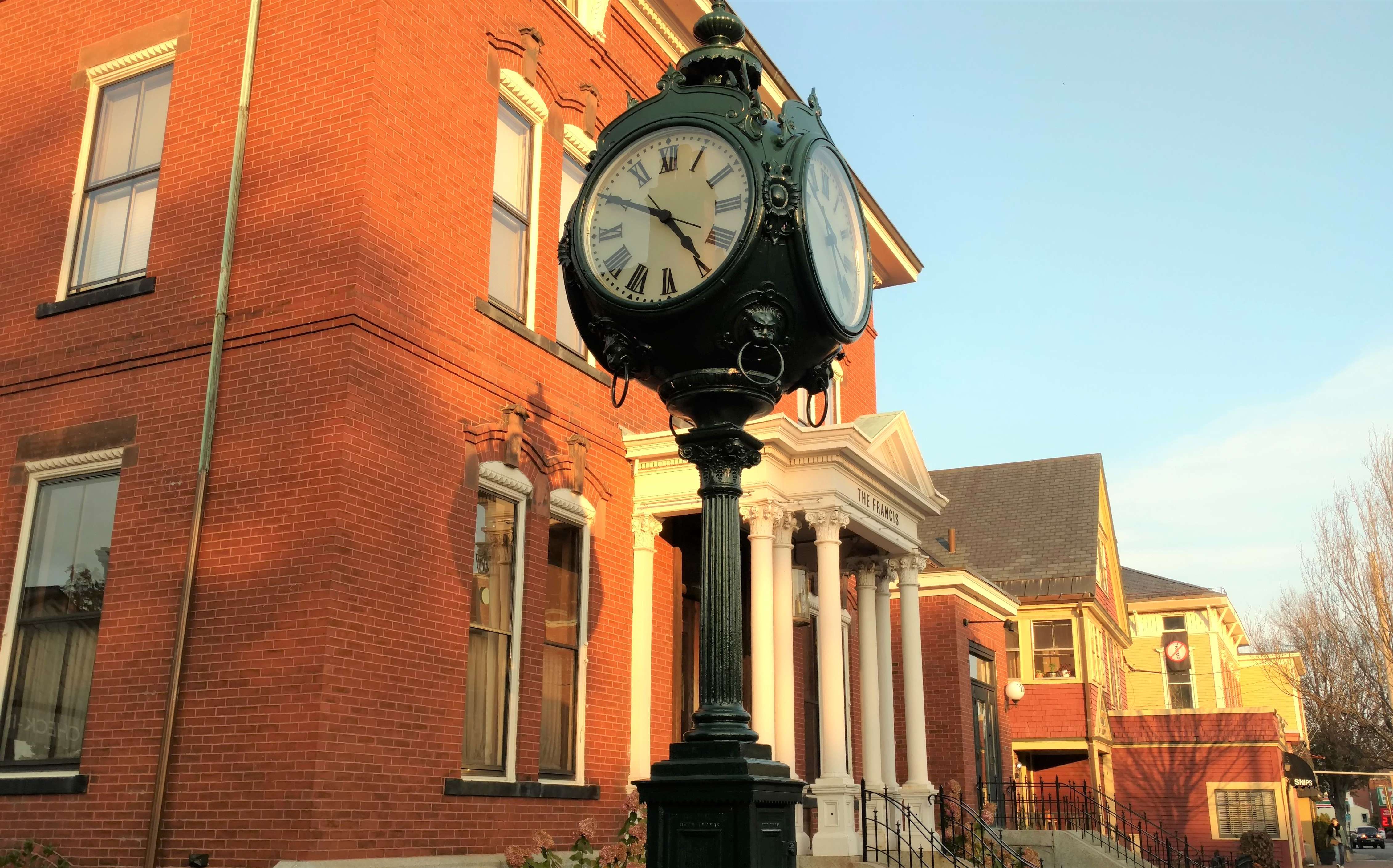
Processing Your Payment
Please do not leave this page until complete. This can take a few moments.
Maine could soon 'fall back' for the last time
 Photo / William Hall
At Swiss Time, a watch and clock merchant in Portland, employees will spend hours resetting almost 1,000 timepieces this weekend.
Photo / William Hall
At Swiss Time, a watch and clock merchant in Portland, employees will spend hours resetting almost 1,000 timepieces this weekend.
For daylight saving time, the clock is ticking.
This year’s observation of the century-old timekeeping practice comes to an end Sunday, Nov. 1, at 2 a.m., when clocks in nearly all states including Maine are due to be turned back one hour. Plans call for the state to “spring ahead” and begin DST again on the second Sunday of March — March 14, 2021.
But some politicians want to permanently end the twice-yearly clock conversion, and may finally be getting their way.
There's long been controversy over daylight saving time. Critics have said the clock resets disturb human sleep cycles and result in lost business productivity, an uptick in traffic accidents, health risks and other problems.
A bill introduced in 2017 by state Rep. Donna Bailey, D-District 14, would have permanently switched Maine to Atlantic Standard Time, which governs time in New Brunswick and Nova Scotia and is one hour “ahead” of Eastern Standard Time — in effect, the same as Eastern Daylight Time. The proposal was contingent on Massachusetts and New Hampshire making similar changes, and required federal approval.
But the bill never got to a vote in the Maine Legislature. A similar measure was introduced in January 2019 by state Rep. Christopher Kessler, D-District 32, and also died.
However, another daylight saving bill, authored last year by Bailey and co-sponsored by Kessler, made it through the Legislature. Without much public attention or even a signature by Gov. Janet Mills, the legislation became law in June 2019.
It requires Maine to immediately adopt daylight saving time year-round, provided that other Eastern states enact similar changes and that the federal government allows them.
And now Congress is inching closer to doing just that.
Many political prongs
In September, U.S. Sens. Marco Rubio, R-Fla., and Rick Scott, R-Fla., introduced legislation that would keep the country on daylight saving time through next fall.
Like the Maine lawmakers, Rubio has introduced similar legislation before. But he believes that because of the pandemic, this year’s try may have more appeal. The proposal would provide much-needed stability for Americans trying to cope with COVID-19, he said in a statement.
“Our government has asked a lot of the American people over the past seven months, and keeping the nation on daylight saving time is just one small step we can take to help ease the burden,” Rubio said. “More daylight in the after-school hours is critical to helping families and children endure this challenging school year.”
Florida passed state legislation in 2018 to establish year-round DST, but like Maine’s act, the law is contingent on changes at the federal level. Both states are part of a groundswell of interest in eliminating the temporary time measure.
In fact, since 2015, more than 200 bills and resolutions spanning virtually every state have been launched to change the practice of daylight saving time, according to the National Conference of State Legislatures. Until 2018, not a single bill had passed. But since then, Florida, Maine and 11 other states have enacted such laws — six in 2020 alone.
Back in Maine, Kessler also has a back-up plan.
The South Portland energy auditor, who is running for election to a second term against Republican Tammy Walter of Cape Elizabeth, told Mainebiz that if he retains his seat he will introduce a bill that would reject Maine’s use of DST completely.
His strategy takes advantage of a legal loophole. While changing time zones or creating year-round observance of daylight savings requires federal approval, states are free to opt out of DST through their own legislation. Arizona and Hawaii, in fact, exempted themselves after the federal Uniform Time Act was passed in 1966.
“We’ve always had the authority to adopt standard time,” Kessler said Saturday. “It’s not ideal, but at least we can stop having to change the clocks.”
Pros and cons
Daylight saving time, first used during World War I as a way to reduce fuel consumption and help the war effort, has been hailed as an energy saving measure ever since. The U.S. Department of Transportation also claims that by aligning more daylight with typical waking hours, DST improves visibility for drivers and helps reduce traffic accidents.
There are similar claims about the impact of daylight saving on crime. For example, a study by the Law Enforcement Assistance Administration found that crime was consistently less during daylight saving than in comparable periods of standard time. Data for one city showed violent crime was 13% less.
But experts also point to a downside.
“Other studies have shown negative impacts on people’s health and circadian rhythms because of time changes as well as a higher number of car crashes and workplace injuries in the days after a time change,” reports the NCSL, which has studied daylight saving time extensively.
“It would seem that a primary complaint of those seeking a change from the current situation is the act of time switching itself, and the problems that it creates … The actual March and November time changes are almost universally reviled because of all the accompanying adjustments that all of us make, like coming home from work in the dark and the slower-than-expected resetting of our internal time clocks.”

But people shouldn’t focus on the drawbacks of the time changes themselves, believes David Prerau, a scientist who helped author the largest technical study ever conducted on the effects of DST and has frequently advised Congress and the British Parliament on them.
The current system strikes a balance between the benefits of being able to enjoy sunlight late in the day for eight months a year, while during four months minimizing the morning hours that remain dark when most people are awake.
“I like to think of daylight saving time as a compromise,” Prerau told Mainebiz in a phone interview from his suburban Boston home. “The current arrangement is a good balance between two different goals.”

Referring to his consulting work with the federal government 15 years ago, when Congress extended DST to its current length, Prerau said, “We were trying to make the days long but to move away from dark mornings ... It's not perfect, but it's the best solution we have."
The effects of the time resets are "transient," Prerau said, and outweighed by the longer-term impacts. If Maine were on Atlantic Standard Time, or to observe daylight saving time year-round, he noted, parts of the state wouldn’t see the winter sun rise until almost 8:15 a.m.
“It’s the effects of a few days versus the effects of many days,” he said.
Kessler, in contrast, feels the impact of the transition is significant. He wants to end the clock resetting because of “just personally being sick of it," and believes there is growing popular and political support for making a change. Like Rubio, he feels the pandemic has increased that support.
“I feel the time is ripe for it given the change in behavior we have all had to endure during this pandemic,” Kessler said.
The preliminary results of a Mainebiz Flash Poll this week may back up his claim. By Tuesday morning, Mainebiz had received over 430 responses, and 84% of them said Maine would be better off without the clock adjustments.
Business fallout
Some businesses have voiced opposition to daylight saving because of productivity lost during the time change, whether due to workers who are groggy or simply because of administrative hassle.
For other businesses, effects of the time change are outweighed by effects of changing the current time conventions.
In public hearings on last year's bills, the president and general manager of Westbrook-based television broadcasters WMTW-TV and WPXT-TV warned of what he believed would happen if Maine's clocks weren't synched with those in other states.
"If Maine were to convert to AST or permanently move to Eastern Daylight Time, it would drastically disrupt how Mainers watch television," said David W. Abel in his testimony. News broadcasts, popular TV programs and special televised events would have to air an hour later in the day, he said.
Viewers would stay up later to watch TV, disturbing sleep habits, he said.
"Beyond inconvenience to viewers, this will result in exhausted workers, students and employees, which will lead to a loss in daily productivity and suboptimal learning — neither of which Maine can afford," Abel testified.
In fact, many businesses could be out of step with their East Coast partners if Maine changed timekeeping without the cooperation of other states.

"You'd be a lot farther away from your markets," Prerau said.
But both he and Kessler said there are workarounds, whether businesses are adjusting to a new time standard or simply the changing standard Maine currently uses.
"There's a big concern about how [a new time standard] would jibe with interstate commerce," Kessler said. "But the hour difference is an easily solvable problem. It's a non-issue."
For one Maine business, however, the fate of daylight saving time has much different implications.
Swiss Time is a watch and clock merchant in Portland, founded in 1977 by Claude Guyot, a watchmaker from Switzerland. Now led and co-owned by his son, Kris, the small shop in the Old Port District has a staff of six and roughly 100 clocks onsite — plus hundreds of watches.
Resetting the nearly 1,000 timepieces to Eastern Standard Time would take one employee "most of a day," Guyot told Mainebiz. Instead, he and his team plan to begin changing the time a couple of days in advance, and slowly work their way through the entire inventory by Nov. 1.
Guyot said the business doesn't have an official stand on the pros and cons of DST, but that in his view "anything that's simpler would probably be better."
Moving all those clock hands and winding watches to a new time, he said, "can certainly get a little rough on the fingers."










0 Comments